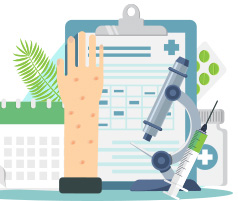 As a parent, you've no doubt heard about this year's measles outbreak. It's the highest number of measles cases the U.S. has seen since 1994. And most of those measles cases have occurred among unvaccinated people.
As a parent, you've no doubt heard about this year's measles outbreak. It's the highest number of measles cases the U.S. has seen since 1994. And most of those measles cases have occurred among unvaccinated people.
Some parents choose not to get their kids vaccinated because they're concerned about the vaccine's safety. But research shows that the measles vaccine is safe and does not cause autism or other diseases.
In contrast, measles itself can sometimes be severe in young children. It can lead to complications like pneumonia and brain swelling. In rare cases, children even die from measles.
What's more, measles is highly contagious. You can get it just from being in a room within a couple of hours after a person with measles has been in it. And measles is more likely to spread through communities where people aren't vaccinated. This is a big risk for people who can't be vaccinated against measles, such as babies less than a year old.
Measles was virtually eradicated in the U.S., thanks to vaccinations. But outbreaks, like the one this year, still occur when unvaccinated travelers from the U.S. get the disease overseas and then bring it back here.
The measles-mumps-rubella (MMR) vaccine protects children from measles. Two doses are needed—the first one at 12 to 15 months old and the second at 4 to 6 years old.
If you have questions about measles vaccines for your child, ask your health care provider.
Sources: American Academy of Family Physicians; American Academy of Pediatrics; Centers for Disease Control and Prevention